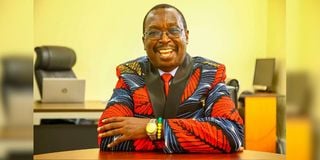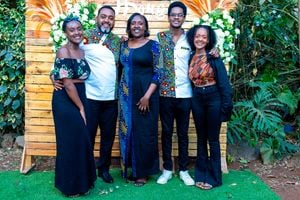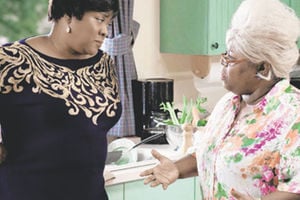
Prof Martin Njoroge the Dean of the School of Humanities and Social Sciences at USIU-Africa during an interview at his office in the University on June 12, 2024.
That Sunday school song, “Father Abraham had many sons, I am one of them, and so are you, let us just praise the Lord,” is the best chorus that describes Prof Martin Njoroge.
He is a father to many children, and as an “African man, does not count his children.
At his home, there are many photo frames on the wall. How many frames?
“They are my family,” he tells Lifestyle laughing, a burst of infectious laughter that made us laugh back.
He takes out his phone and shows us the photos of his many children, one after another, mentioning where they are and what they do.
They are in different countries, either working or studying.
He also shows us “I love you, Dad,” a WhatsApp message from one of his children. They had been chatting before he received us.
"Reading this makes me want to cry,” he says, a bit uncomfortable though about a professor getting teary over a text message.
Not all these children are his, atleast biologically. Prof Njoroge is a father of two biological children, a son and a daughter aged 25 and 23 but he also has “hundreds of other children.” He took in most of the children as orphans. Some are from families where parents separated due to gender-based violence.
“My focus on the children, whether they are adopted or biological, is to ensure that they grow academically, mentally, spiritually, and financially. My role in their lives is giving them that father figure and being a role model,” he says.

Prof Martin Njoroge the Dean of the School of Humanities and Social Sciences at USIU-Africa.
Growing up in the small village of Ruburi in Gatundu South, he says he had a dream of becoming a medical doctor like one of his uncles.
His desire to excel saw him walking over 10 kilometres barefoot every school day. He passed his exams and joined Starehe Boys Centre, marking the genesis of his exposure to city life.
“My older siblings often visited me in high school, they encouraged and motivated me to work hard,” says the 9th born in a family of 11.
While in high school, his father was diagnosed with cancer. After four years, he died.
“A day before he died, lying on his death bed, he blessed me and told me that education would take me far and that one day I would go to America and become a professor," he says.
The death of his father almost marked the end of his college studies, until well-wishers stepped in.
Years later, that drove him to start the Acme Enrichment Network International (AENI) mentorship ministry to change the lives of vulnerable children.
Through the programme that he started in 2003, he mentors pre-university students alongside his wife every school holiday.
His father’s blessing upon his life came to pass when he went to the US, at the University of Pennsylvania, for his postdoctoral fellowship in 2007 and in 2014, when he became a professor.
“My trip to the US was emotional as it happened 15 years after my dad’s death, and indeed, education has taken me far,” says the Dean of the School of Humanities and Social Sciences at United States International University Africa (USIU).
Like Father Abraham in the Bible, Prof Njoroge has factored in his big family and each of them knows their bedrooms.
His joy is seeing them walk out of his house successfully to start their families but still realise they have a father and a home to go to at any time.
“We have not gone through formal adoption, but in our hearts, we have a solid relationship that cannot be defined by papers. My children know this home is where you are loved, accepted, and received, whether you have weaknesses or not. It is where you go and have solace when you are in your low moments,” says Prof Njoroge.
The children have retained their biological fathers’ names.
John Kanyoni, a 63-year-old engineer, is another mentor father. He offers mentorship to the children he rescues from the streets and hosts them at Watu Wa Maana Children Centre, which he founded in 2001. He lived mostly with his stepmother in Nairobi, where his father used to work.
“I felt isolated most of my life, and it got worse because during our time we could only communicate through letters. Sometimes I could lose contact with either of my parents for almost a year, though they were alive,” he talks of his childhood troubles.
His excellent academic performance and talent in drama made him stand out when he joined Ofafa Jericho Schoo. He was elected school captain.
The position helped him acquire leadership skills as a young boy. Being a leader, he says, also pushed him to maintain his academic performance as he saw himself as a role model to his schoolmates.
“I emerged the top candidate and that increased my chances to go for my A level at Kanunga High School and when the principal learned that I was a captain in my former school, he appointed me a captain there,” says Mr Kanyoni.
His mentorship journey started when he became a big brother to ten vulnerable learners in the same boarding school as him.

Engineer John Kanyoni, founder of Watu Wa Maana Children Centre in Ruiru during an interview at Nation Center on June 11, 2024.
The third born in a family of nine says that he has missed a father figure all his life, and being a school captain, made him take on responsibilities that went beyond keeping school rules.
“Because of what I lacked from my father, I put it in me that I would always be there for my children. I have never missed any of their school meetings, I know all their birthdays and I do celebrate those days with them,” says the father of five.
While Mr Kanyoni is a retiree and his biological children are now adults, he is still a passionate father to the young children at the Watu Wa Maana Children Centre.
The Ruiru-based centre has 34 children in primary school, 23 in high school, and 13 in college.
“We started visiting children on the streets with my wife, and all of them were only talking about their mothers. None of them were talking about their fathers. Most of them don’t know their fathers, some of them were told their fathers were dead while they were still alive,” he says.
He founded the home to protect the children from the negative effects of growing up without a father figure.

Engineer John Kanyoni, founder of Watu Wa Maana Children Centre in Ruiru.
“There was a time I visited two street boys who told me that their mother died the previous day and her body was still in the house. I went with them home and found the body. The neighbours were there, but they were drinking the illicit brew. I called the area chief, and the body was taken to the mortuary,” says the retired Multimedia University of Kenya lecturer.
He helped the two brothers deal with the loss of the only parent they had known until her funeral.
The eldest boy was eight years old, and Mr Kanyoni took them in. These were among the first children they brought to the centre.
“Being the father figure and nurturing these children helps me understand situations that people go through,” he says.
According to a life coach, Wanyonyi Wafula, offering an alternative home to a needy person and providing them with resources as though they were your own creates a bonding environment that contributes to holistic growth for any person.
“A true father shows true love to the children, whether he sired them or not because, at the end of everything, we look at humanity rather than the blood relationship. A true father has true love and care,” says the life coach.








